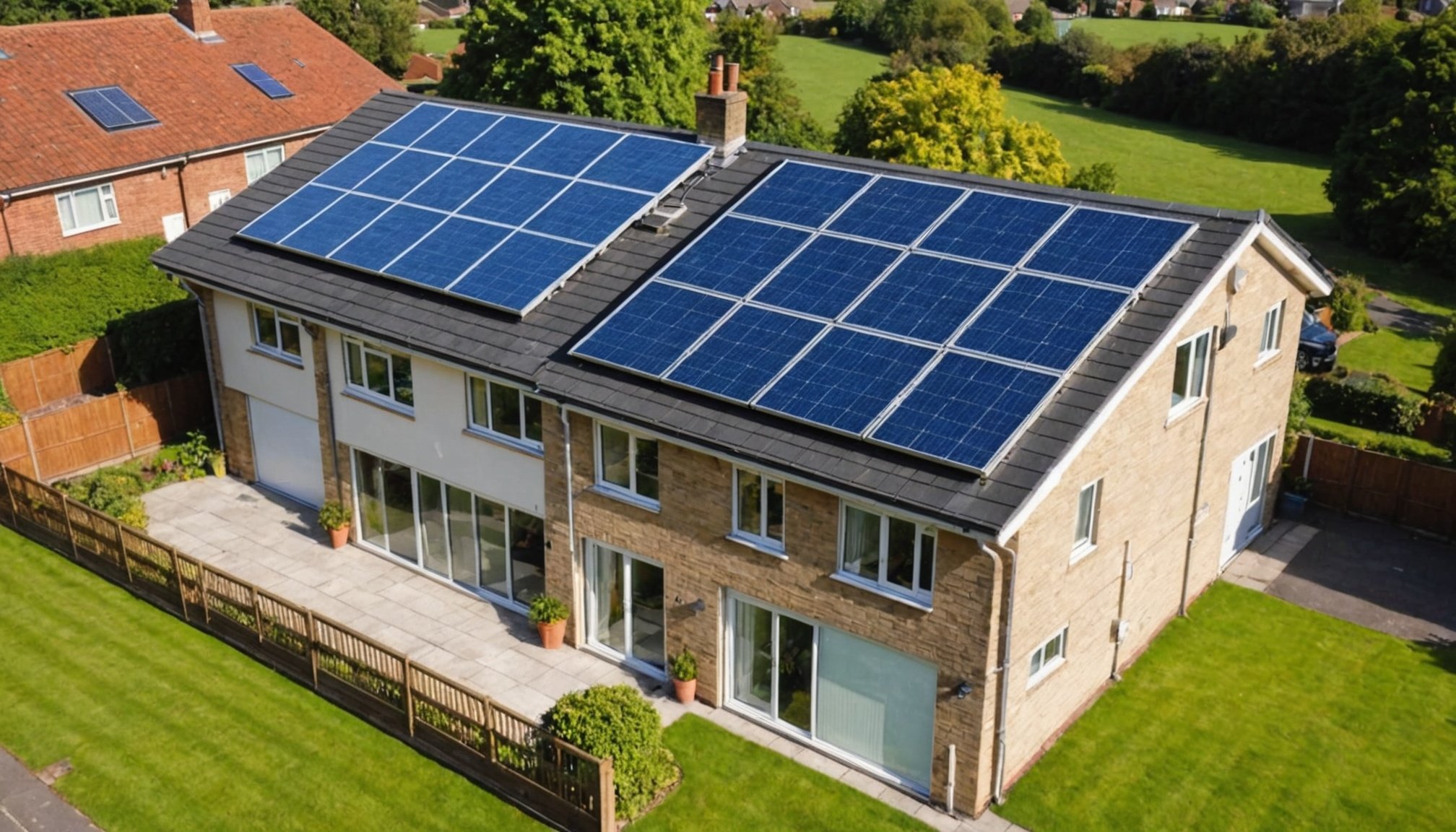Unlocking Profit: The Financial Advantages of Solar Panel Installation for UK Rental Properties to Solar Power and Its Growing Importance
In the UK, the shift towards renewable energy is gaining momentum, and solar power is at the forefront of this transition. For landlords and property managers, installing solar panels on rental properties can be a savvy business move, offering a multitude of financial benefits. Here, we delve into the advantages of solar panel installation, exploring how it can enhance your property value, reduce energy costs, and contribute to a more sustainable future.
Financial Benefits of Solar Panel Installation
Reduced Energy Costs
One of the most immediate benefits of installing solar panels is the significant reduction in energy costs. Solar energy allows properties to generate their own electricity, thereby reducing reliance on the grid and lowering energy bills.
Also to see : Exploring Mortgage Solutions for First-Time Homebuyers in the UK”s Remote Regions
- **Energy Savings**: By producing their own electricity, properties can save substantially on energy costs. For example, a commercial property with a 50 kW solar system can save up to £8,000 per year on energy bills[2].
- **Long-Term Savings**: Over the lifespan of the solar panels (typically 25 years), the cumulative savings can be substantial, making it a long-term investment with clear financial returns.
Increased Property Value
Solar panels can also increase the value of your property, making it more attractive to potential tenants and buyers.
- **Enhanced Appeal**: Properties with solar panels are often seen as more desirable due to their energy efficiency and reduced energy costs. This can lead to higher rental income and faster property sales.
- **Green Credentials**: In a market increasingly conscious of environmental impact, having solar panels can be a major selling point, enhancing the property's value and appeal.
#### Government Incentives and Export Guarantee
The UK government offers various incentives to encourage the adoption of renewable energy. One such incentive is the Smart Export Guarantee (SEG), which requires energy suppliers to pay households and businesses for the excess energy they export back to the grid.
plaintext
Have you seen this : Exploring the Influence of Garden Landscaping on Your Home”s Market Worth and Insurance Costs in the UK
- Smart Export Guarantee: Under the SEG scheme, property owners can earn money by selling excess energy generated by their solar panels back to the grid. This provides an additional revenue stream and further enhances the financial benefits of solar panel installation[2].
- Other Incentives: While the Feed-in Tariff (FIT) scheme is no longer available for new installations, other incentives such as tax relief and grants can still be explored to offset the initial cost of installation.
### Commercial Solar: A Smart Business Decision
For commercial properties, installing solar panels can be a strategic business move that aligns with both financial and environmental goals.
#### Case Study: Carrefour's Solar Initiative
A notable example is the initiative by Carrefour, a major retailer, to install solar panels on the parking lots of its hypermarkets and supermarkets. This project involves the installation of solar panels on nearly 180,000 parking spaces across 90 hypermarkets and 260 supermarkets, with a total capacity of 350 MW. This not only reduces Carrefour's energy costs but also helps in meeting legal obligations to solarize parking areas[1].
- Scale of Savings: With a capacity of 350 MW, Carrefour’s project is expected to produce around 450 GWh of electricity annually, equivalent to the energy consumption of a city with 200,000 inhabitants. This scale of energy production can lead to significant cost savings and a reduced carbon footprint.
- Long-Term Contract: The 20-year contract ensures a stable and predictable energy cost for Carrefour, providing long-term financial stability and reducing the risk associated with fluctuating energy prices.
### Energy Efficiency and Smart Systems
Modern solar panel installations often come with smart systems that optimize energy efficiency and provide real-time monitoring.
#### Smart Monitoring and Control
Smart monitoring systems allow property owners to track the performance of their solar panels in real-time, identifying any inefficiencies or issues promptly.
- Real-Time Monitoring: With smart monitoring, you can see exactly how much energy your solar panels are producing and how much you are saving. This data can be used to optimize energy usage and ensure the system is running at peak efficiency.
- Automated Maintenance Alerts: Smart systems can alert you to any issues, such as panel malfunctions or reduced performance, allowing for quick maintenance and minimizing downtime.
#### Battery Storage Integration
Battery storage is becoming increasingly important as it allows properties to store excess energy generated during the day for use during the night or during periods of low sunlight.
- Energy Storage: Integrating battery storage with your solar panel system can further reduce your reliance on the grid. This is particularly beneficial for commercial properties that have high energy demands during evenings or periods of low sunlight.
- Cost-Effective: While the initial cost of battery storage can be high, it can provide significant long-term savings by reducing the need for grid electricity during peak hours.
### Practical Considerations and Advice
Before installing solar panels, there are several practical considerations to keep in mind.
#### Initial Costs and Financing Options
While the initial cost of installing solar panels can be substantial, there are various financing options available to make it more accessible.
- Financing Options: Many companies offer financing options for solar panel installations, such as loans or leasing agreements. For example, Crédit Agricole Transitions & Énergies has launched a financing platform to support the installation of solar panels on rooftops and parking lots, with an ambition to fund projects worth 200 million euros by 2027[1].
- Cost-Benefit Analysis: It’s crucial to conduct a thorough cost-benefit analysis to ensure that the installation aligns with your financial goals. This includes considering the initial cost, potential savings, and any available incentives.
#### Choosing the Right Installer
Selecting a reputable and experienced installer is vital to ensure the quality and efficiency of the solar panel system.
- Reputation and Experience: Look for installers with a proven track record and positive reviews. Ensure they are certified and have experience in installing solar panels on commercial properties.
- Warranty and Maintenance: Check the warranty offered by the installer and their maintenance services. A good installer should provide comprehensive after-sales support to ensure the system runs smoothly over its lifespan.
### Environmental Benefits and Carbon Footprint Reduction
Beyond the financial advantages, solar panel installation also offers significant environmental benefits.
#### Carbon Footprint Reduction
Solar energy is a clean and renewable source of power, significantly reducing the carbon footprint of properties.
- Carbon Emissions: By generating electricity from solar power, properties can reduce their carbon emissions substantially. For instance, the University of Southern California’s solar panel installation is expected to save 100,000 tonnes of CO2 over 25 years[2].
- Sustainable Future: Contributing to a reduction in greenhouse gas emissions, solar panels play a crucial role in creating a more sustainable future.
“`
Agrivoltaics: Combining Agriculture and Solar Power
Agrivoltaics, the practice of combining agriculture with solar power, is another innovative approach that offers both energy and agricultural benefits.
“`plaintext
- Dual Use of Land: Agrivoltaics allows for the dual use of land, generating electricity while also maintaining agricultural productivity. This approach is being tested in various regions, including the UK, where universities like the University of Greenwich are conducting research on its feasibility and benefits[3].
- Increased Efficiency: By using semi-transparent solar panels, agrivoltaics can enhance crop productivity while generating renewable energy, making it a highly efficient use of land.
“`: Why Solar Panels Are a Smart Investment for UK Rental Properties
In conclusion, installing solar panels on UK rental properties is a smart investment that offers a range of financial, environmental, and practical benefits. From reducing energy costs and increasing property value to contributing to a sustainable future, the advantages of solar power are clear.
Key Takeaways
- Financial Savings: Significant reductions in energy costs and potential revenue through the Smart Export Guarantee.
- Increased Property Value: Enhanced appeal and value of the property due to energy efficiency and green credentials.
- Environmental Benefits: Substantial reduction in carbon footprint and contribution to a sustainable future.
- Smart Systems: Real-time monitoring and battery storage integration for optimized energy efficiency.
- Practical Considerations: Careful selection of financing options and installers to ensure a successful installation.
By considering these factors and taking the leap to install solar panels, landlords and property managers can unlock a wealth of benefits that make their properties more valuable, efficient, and sustainable.
Table: Comparative Analysis of Solar Panel Installation Costs and Savings
| Aspect | Initial Cost | Annual Savings | Long-Term Savings | Environmental Impact |
|---|---|---|---|---|
| Small Commercial Property (10 kW) | £15,000 – £20,000 | £1,500 – £2,000 per year | £37,500 – £50,000 over 25 years | 10 tonnes CO2 reduction per year |
| Medium Commercial Property (50 kW) | £75,000 – £100,000 | £7,500 – £10,000 per year | £187,500 – £250,000 over 25 years | 50 tonnes CO2 reduction per year |
| Large Commercial Property (100 kW) | £150,000 – £200,000 | £15,000 – £20,000 per year | £375,000 – £500,000 over 25 years | 100 tonnes CO2 reduction per year |
Detailed Bullet Point List: Benefits of Solar Panel Installation for UK Rental Properties
- Reduced Energy Bills: Generate your own electricity and reduce reliance on the grid.
- Increased Property Value: Enhance the appeal and value of your property.
- Government Incentives: Benefit from the Smart Export Guarantee and other incentives.
- Long-Term Savings: Cumulative savings over the lifespan of the solar panels.
- Environmental Benefits: Reduce your carbon footprint and contribute to a sustainable future.
- Smart Monitoring and Control: Optimize energy efficiency with real-time monitoring.
- Battery Storage Integration: Store excess energy for use during periods of low sunlight.
- Low Maintenance: Solar panels require minimal maintenance over their lifespan.
- Durable Systems: Solar panels can last up to 25 years or more.
- Export Guarantee: Earn money by selling excess energy back to the grid.
By understanding and leveraging these benefits, landlords and property managers in the UK can make informed decisions about investing in solar panel installations, unlocking a path to greater financial efficiency, sustainability, and long-term value.











